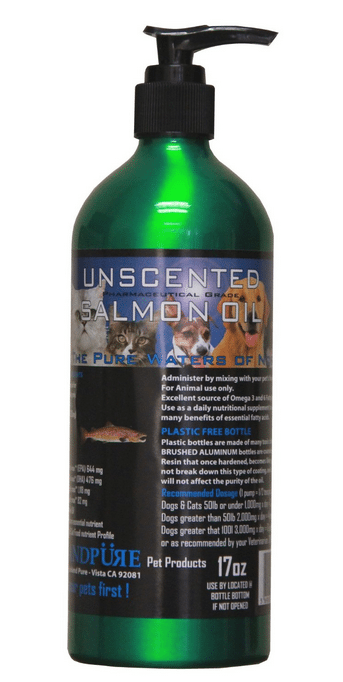The Wrong Fish Oil Can Be Dangerous for Dogs: Choose Wisely

There have been quite a few studies already done regarding the rewards of adding a good fish oil to your dog’s daily diet.
Although I’ve done many of my own feed trials over the years and recognized the many benefits of adding a good fish oil to my own dogs diet; I don’t think the actual studies have yet proven all the rewards of this incredible fatty acid.
But, not every fish oil out there is good and too much fatty acid supplementation for your dog isn’t a good thing either, since too much can cause soft, messy stool, disrupt your dog’s hormonal harmony and cause a deficiency in vitamin E.
It’s critical that you choose the right oil and give your dog the correct dosage as well.

What Can a Good Brand Do for Your Dog?
Initially fish oil was used for the treatment of allergies in dogs. Then later in March of 2003, the American Veterinary Medical Association (AVMA) concluded that in three studies they found that dogs who ate high levels of omega 3 fatty acids seen tremendous pain reduction from osteoarthritis.
According to the studies, both pet owners and veterinarians indicated noticeable improvement with flexibility in the dogs.
There are many good pet products on the market that claim to do a lot of things, yet many can’t live up to what a good oil can deliver.
Fatty acids are crucial nutrients that are beneficial no matter what the age of the dog. A GOOD source of Omega 3‘s (EPA and DHA) and Omega 6’s can promote optimal health for your dog on the inside of his body and out!
It’s good for general and preventative maintenance, providing you buy a good quality fish oil. It can help with your dog’s dry skin and coat problems, neurological issues, heart and joint health.
Outside of preventative maintenance, here’s a list of conditions and diseases that fish oil may be helpful for:
- Atopic Dermatitis (allergies)
- Asthma
- Arthritis
- Joint Pain
- ALL Autoimmune Diseases
- Dry Eye
- Cancer
- Heart Disease
- Cognitive Disorder
- Diabetes
- Gastrointestinal Issues
- Inflammatory Bowel Disease
- Bladder Infections and Stones

Interaction — Warning
According to the NIH (National Library of Medicine), high doses of fish oil can slow clotting of the blood. They indicate that taking HIGH doses of fish oil with certain herbs causes bleeding in some people. They recommend avoiding Angelica, Clove, Danshen, Garlic, Ginger, Ginkgo, Panax ginseng, Red clover, Turmeric, Willow, and others that cause the blood to clot too slowly.
This doesn’t mean you can’t include fish oil for your dog if your giving one of the above herbs. It just means problems can occur if taking high doses (not normal doses) and combining it with the above herbs.
What To Look For In A Good Fish Oil
It doesn’t matter if you purchase liquid or capsules. Most dog owners find it more convenient to use the liquid form in a pump bottle. But, if you do purchase a liquid form, it MUST be refrigerated for shelf life purposes and to slow down the oxidation process and rancidity. Look for fish aluminum bottles or dark glass and avoid plastic bottles.
Some manufacturer’s will include vitamin E in the oil, since vitamin E can be used as a natural preservative. Regardless, refrigerate all liquid forms.
If you buy capsules, you don’t have to refrigerate since the actual capsule itself is believed to protect the oil inside (at least a little). Regardless of which form you buy; use it before the expiration date!
So, what’s the difference in fish oils? Low grades of fish oil include a lot of pollutants such as heavy metal, mercury and other toxins, which unfortunately is very common in sea food.
If it smells like fish, get rid of it! It could be rancid. A good fish oil may have a slight fishy odor that comes from the ocean. Avoid fish oils that include lemon or citrus smells. This is a good indication that the manufacturer may be hiding something.
A questionable, stinky, rancid fish oil won’t help your dog’s health issues, inflammation and arthritic joints; in fact, it can make the problem worse!
The wrong oil could potentially do more harm than good if your dog already has some health concerns that you may, or may not know about that could further harm the immune system. Good examples of when a toxic fish oil could potentially harm your dog even more; would be if your dog has liver disease or cancer and you don’t know it.
Let’s outline the three biggest factors to take into consideration when deciding on a brand:
- The product that you buy for your dog, MUST be fresh and pure. If not, you are defeating the entire purpose of feeding it to your dog in the first place. If the product is rancid and contains toxins, it will have a negative effect on your best friend vs the positive outcome you want. Read labels and ask questions. If the label doesn’t state what type of fish is used, don’t buy it.
- Shelf life and Oxidation: Remember what I mentioned above. The oil should basically be odorless, or have a mild fresh ocean scent (if any).
- The product should accurately indicate the amount of EPA and DHA provided per teaspoon, etc. After all, EPA and DHA are the reasons you are giving it to your dog.
So, there you have it. You now know how to search out a good fish oil for your own dog.











